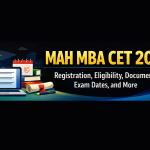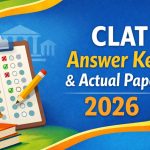CLAT 2025 Previous Year Paper: English Section Analysis
Download CLAT 2025 English Section: Click Here
The CLAT 2025 English paper consists of passage-based questions designed to test reading comprehension, inference, vocabulary, and critical thinking skills. Below is a questionwise analysis based on the main passages and corresponding question sets from the official paper.
| Passage Number/Theme | Passage Theme/Topic | Question Types | Skills Tested | Notable Features / Difficulty Level |
| 1 - Literary motivation (Orwell) | Literary motivation and psychological nuances | Inference, author’s intent, vocabulary | Comprehension, analysis | Psychological nuances; Moderate |
| 2 - Education/teaching methods | Education/teaching approaches | Application, parental observation, antonym | Observational skills, logic | Pedagogical philosophy; Moderate |
| 3 - Education philosophy | Education & character building | Summarization, inferential reasoning | Critical thinking, logic | Social values emphasized; Moderate |
| 4 - Education & Character Building | Education philosophy and character formation | Inference, summarization, vocabulary | Critical thinking, comprehension | Moderate difficulty |
| 5 - Logical/Analytical Reasoning | Logical and analytical reasoning | Deduction, condition analysis | Logic, reasoning abilities | Moderate to high difficulty |
| 6 - Social/Legal Issue | Social/legal contemporary issues | Inference, critical evaluation | Analytical reading, vocabulary | Moderate difficulty |
Passage 1: Why I Write (George Orwell)
This passage explores the personal motivations and psychological background behind Orwell's literary pursuits, emphasizing early childhood experiences and the emotional attitude of a writer.
- Q1: Orwell's loneliness led to "making up stories," capturing formative imagination and the coping mechanism of an isolated child.
- Q2: Background information is given to illustrate the necessity of understanding a writer’s motives through formative experiences, making answer choice "B" the best-fit.
- Q3: Escaping early impulses would mean "losing the urge to write," reflecting how formative influences shape lifelong creative impulses.
- Q4: "Aesthetic enthusiasm" is positioned as valuable and non-utilitarian, focusing on sharing meaningful experiences (answer: "C").
Passage 2: Qualities of Teachers and Education
This passage discusses the attitude and method of effective teachers, students’ impressionability, and parental observation.
- Q9: The right kind of teacher should "focus on studying each student individually," reflecting individual attention rather than universal approaches.
- Q10: We hope for quick remedies because "we lack understanding, patience and love," not intelligence or skills, as per the passage.
- Q11: The chief quality of a parent is studying the "tendencies, moods, and peculiarities" of the child (answer: "B").
- Q12: The antonym for "volatile" is best captured by stable, steady, and constant; "D" (All of the above) includes all valid options.
Passage 3: Education Philosophy (Swami Vivekananda)
This excerpt advocates for life-building and character-forming education, distinguishing real learning from rote memorization.
- The passage argues that mere accumulation of information does not equate to true education; rather, development of will and character is necessary.
- Achieving knowledge and growth is based on "concentration," illustrated through analogies (chemist, willpower) and the purpose of education (man-making).
Question Types and Difficulty
- Most questions are direct inference, asking for selection of the best interpretation based on explicit passage statements.
- Some require vocabulary skills, such as identifying antonyms and contextual meaning.
- Other questions focus on author's intent, values, and implications, testing higher-order thinking and synthesis.
- Difficulty level: Most questions rank as moderate, with some requiring nuanced comprehension and attention to authorial tone or intent.
This balanced distribution ensures candidates are tested on comprehension, reasoning, and application of language and logic in various contexts aligned with legal studies and contemporary issues.
Each passage was supported by 4-5 multi-choice questions with balanced distribution across answer positions, and answer choices reliably encourage textual reference-based selection.
Observations
- The paper remains close to trends of comprehension over grammar, demanding careful reading and reflection.
- Question design tests not just memory, but application and interpretation skills relevant for legal studies and contemporary issues.
- Vocabulary and synonym/antonym tasks remain integrated into meaningful contexts rather than isolated word knowledge.
The questionwise approach in CLAT 2025 English paper suggests a shift towards holistic comprehension and critical reading as its core assessment goal.
Literature themes often linked to CLAT comprehension passages, based on the 2025 paper analysis, include:
- Creative and Psychological Motivations: Passages explore why authors write, focusing on personal history, emotional states such as loneliness, ambition, and creative impulses, often drawing on autobiographical or reflective narratives.
- Human Nature and Isolation: Themes of isolation and imaginative coping mechanisms feature strongly, reflecting on inner life and the urge to express oneself.
- Historical and Political Contexts: Literary works sometimes embed political or historical impulses, presenting writing as a vehicle for social change or historical record-keeping.
- Aesthetic and Artistic Values: Emphasis on literary style, use of language for sound and effect, and the artistic purpose of writing is a recurring theme.
- Philosophical Inquiry: Exploration of underlying philosophical ideas concerning writing, creativity, and communication appears frequently.
These themes require candidates to read deeply, interpreting motives and stylistic choices as well as understanding broader literary and political contexts.
Frequently referenced authors in CLAT English comprehension passages based on the CLAT 2025 paper analysis include:
- George Orwell: His essays and reflections, such as "Why I Write," are used to explore personal motivations behind writing, literary ambitions, and political or historical impulses in authorship.
- Swami Vivekananda: Passages from his educational philosophy are cited to discuss life-building education, character formation, the goal of education, and the importance of concentration and willpower.
- Other pedagogical or philosophical figures may appear indirectly through themes of teaching, learning, and human development.
These authors represent a blend of literary, philosophical, and educational thought that challenges candidates to interpret motives, ideas, and values embedded in complex texts.
Important Websites for CLAT 2026 English section Reading Comprehension
| Website | Description | Why Similar to CLAT Passages |
| CommonLit | Free library of 2,000+ literary texts, including classic essays and stories for grades 9-12+. | Philosophical pieces like Orwell's motives for writing, with built-in questions on themes and synonyms. |
| ReadWorks | Thousands of free fiction/non-fiction passages with comprehension questions. | Short story and essay selections similar to Narayan's vivid narratives, searchable by theme (identity, society). |
| LSAC Reading Comprehension Samples | Official LSAT practice passages from complex literary and argumentative texts. | Dense, analytical excerpts like CLAT education passages, testing deep understanding and antonyms/synonyms. |
| eReading Worksheets | Free printable/online reading comprehension worksheets with passages and questions. | Includes literary non-fiction and short stories akin to Vivekananda's character-building themes, inference-focused. |
| EnglishForEveryone.org | High-quality reading comprehension worksheets for K-12 and beyond. | Essay-style passages on personal growth and society, echoing Krishnamurti's reflective education discussions. |
| ReadTheory | Adaptive quizzes with personalized passages from public domain-inspired essays and stories. | Similar to Orwell's introspective style, with vocabulary and critical thinking questions. |
| EnglishClub Short Stories | Classic public domain short stories with vocabulary checkers and comprehension aids. | Narrative excerpts like Narayan's astrologer tale, focusing on descriptive language and cultural themes. |
| Library of Short Stories | Over 1,000 searchable public domain short stories with images and filters. | Literary gems including philosophical shorts comparable to CLAT edited excerpts, ideal for self-guided analysis. |
Related Blogs:
CLAT 2025 Exam Question Paper pdf download
CLAT 2026 Preparation Guide: Syllabus, Exam Pattern, Strategy & 60-Day Master Plan
CLAT 2025 Previous Year Paper: English Section Analysis
CLAT 2025 GK Paper Analysis | 50 Important Topics for CLAT 2026 Preparation




